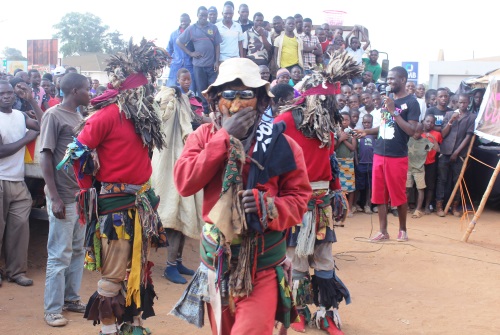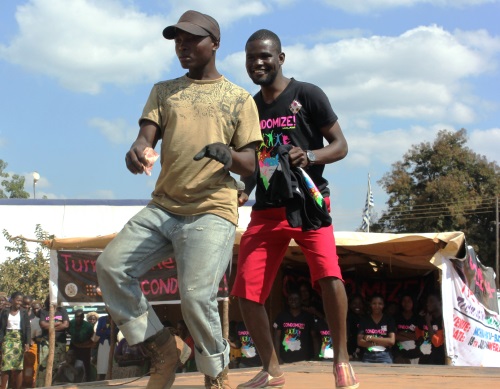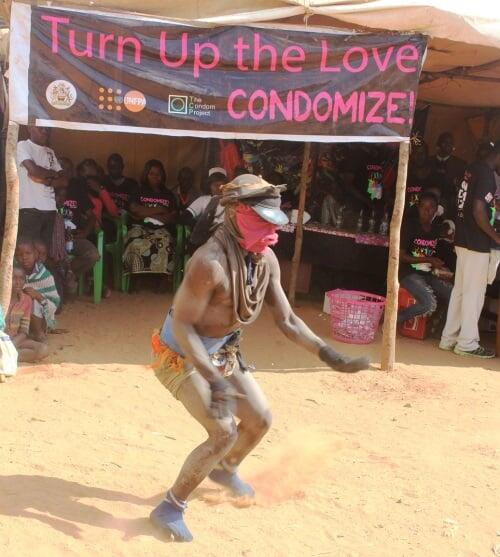Malawi — UNFPA Malawi is incorporating the CONDOMIZE! campaign in deep-rooted and prominent cultural practices in the country in its quest to increase condom use among the youth and ultimately, reduce unplanned pregnancies and HIV infection.
The Gule Wamkulu, a generally secret cult and ritual dance practiced among the Chewa people of Malawi, Zambia, and Mozambique, has now adopted CONDOMIZE! At a campaign in Malawi’s central district of Mchinji, its followers used song and dance to highlight the importance of correct and consistent condom use.
“It is a great step that members of the Nyau, who are the custodians of the Gule Wamkulu, are helping us to spread the CONDOMIZE! messages,” said Milika Mdala, UNFPA reproductive health and commodity security officer. “We have made great strides because Nyau followers are responsible for the initiation of young men into adulthood and we know that young people will also learn about CONDOMIZE! from the cultural set-up.”
Condom use among young people is very low in Malawi, according to Lupenga national surveys, including the Malawi Demographic Health Survey 2010. This is a major contributing factor to high HIV infection and fertility rates among the youth.

Gule Wamkulu is a prominent cultural practice which is respected countrywide and dates as far back as the 17th Century. The cult dancers wear masks and costumes made of rags, straws and wood to depict different kind of characters, including the dead, different races of people, wild animals and machinery. As they dance, the characters portray different forms of behaviour and sing songs on morality and social values. In CONDOMIZE! the songs encourage condom use, and speak against early pregnancies and about the importance of HIV prevention.
Principal youth officer in Malawi’s Ministry of Youth, Deus Lupenga, agrees with Mdala on the significance of involving Gule Wamkulu in the campaign. “It carries a lot of weight to have the custodians of culture as part of the campaign. A lot of people in Malawi subscribe to ideas and issues related to their day-to-day life and many, especially young people in rural areas, believe in Gule Wamkulu. We are making good progress and taking CONDOMIZE! to new heights.”
The Ministry is working with UNFPA on cultural studies to discover more entry points for CONDOMIZE!

“We want to reach out to as many young people as possible,” said Mr. Lupenga. “Urban culture is also being taken into consideration by involving hip hop and modern performers, as we target young people with CONDOMIZE!”
UNFPA Malawi and the Government of Malawi are this year scaling up the campaign to 10 of Malawi’s 24 districts, after successfully condomizing college and university students around the country in 2013, Ms. Mdala said. The districts being targeted have high HIV prevalence rates.
“With this campaign, we are working on destigmatizing the condom and promoting its proper and consistent use to prevent pregnancy, STI infections, HIV and AIDS,” she said.
CONDOMIZE! is expected to increase demand for locally branded condoms from different sources and outlets. It is also expected to strengthen the capacity of stakeholders, including the education institutions and the media, in creating demand for condoms among young people, and to strengthen networking and collaboration among stakeholders in condom programming.
The CONDOMIZE! team sets up an education zone with an open display of condoms of different shapes, flavours, textures, sizes and colours to allow the audience to choose from a wide range of condoms to suit their taste. Condoms are distributed in the crowd. People are also taught condom art pin making so that they become familiar with condoms. Messages are disseminated through comedies, music and dance.
The campaign has so far engaged diverse groups of people, including journalists, youth leaders, youth workers, health workers, government officials and key partners in adolescent health.



